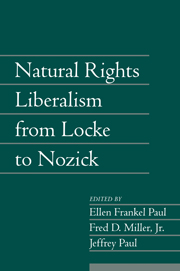Book contents
- Frontmatter
- Contents
- Introduction
- Acknowledgments
- Contributors
- The Political Needs of a Toolmaking Animal: Madison, Hamilton, Locke, and the Question of Property
- Natural Rights and Imperial Constitutionalism: The American Revolution and the Development of the American Amalgam
- There Is No Such Thing as an Unjust Initial Acquisition
- Nozick and Locke: Filling the Space of Rights
- Toward a Theory of Empirical Natural Rights
- History and Pattern
- Libertarianism at Twin Harvard
- Sidney Hook, Robert Nozick, and the Paradoxes of Freedom
- Begging the Question with Style: Anarchy, State, and Utopia at Thirty Years
- The Shape of Lockean Rights: Fairness, Pareto, Moderation, and Consent
- One Step Beyond Nozick's Minimal State: The Role of Forced Exchanges in Political Theory
- Natural Rights and Political Legitimacy
- Consent Theory for Libertarians
- Prerogatives, Restrictions, and Rights
- Index
One Step Beyond Nozick's Minimal State: The Role of Forced Exchanges in Political Theory
Published online by Cambridge University Press: 06 July 2010
- Frontmatter
- Contents
- Introduction
- Acknowledgments
- Contributors
- The Political Needs of a Toolmaking Animal: Madison, Hamilton, Locke, and the Question of Property
- Natural Rights and Imperial Constitutionalism: The American Revolution and the Development of the American Amalgam
- There Is No Such Thing as an Unjust Initial Acquisition
- Nozick and Locke: Filling the Space of Rights
- Toward a Theory of Empirical Natural Rights
- History and Pattern
- Libertarianism at Twin Harvard
- Sidney Hook, Robert Nozick, and the Paradoxes of Freedom
- Begging the Question with Style: Anarchy, State, and Utopia at Thirty Years
- The Shape of Lockean Rights: Fairness, Pareto, Moderation, and Consent
- One Step Beyond Nozick's Minimal State: The Role of Forced Exchanges in Political Theory
- Natural Rights and Political Legitimacy
- Consent Theory for Libertarians
- Prerogatives, Restrictions, and Rights
- Index
Summary
INTRODUCTION
Like so many other scholars who work in the tradition of strong property rights and limited government, I owe a major intellectual debt to Robert Nozick for his 1974 masterpiece, Anarchy, State, and Utopia1-a debt that is now, sadly, beyond our ability to repay. The central points of his argument have been rehearsed often enough, so that a capsule summary should suffice here. As a political theorist, Nozick believed in two propositions. He believed, first, that the minimal state could be justified under the most exacting standards for political obligation, and, second, that-I choose my words carefully–any more extensive state violates the individual rights that the minimal state secures. When these two propositions are united, it follows that the minimal state is the only permissible state. Anything less does not offer full protection to the rights that individuals have. Anything more than the minimal state violates those rights. In effect, the minimal state functions as both the lower and upper bound of a legitimate state, and hence as the only acceptable version thereof.
I think that these propositions are both wrong, and for the same reason; namely, they ignore, or at least understate, the critical role of forced exchanges at both stages of the argument. Perhaps the safest way to put this criticism is this: Nozick begins by developing a theory of the state, and only after that is completed does he develop his theory of individual entitlements in a chapter devoted to undercutting the case for redistribution.
- Type
- Chapter
- Information
- Natural Rights Liberalism from Locke to Nozick , pp. 286 - 313Publisher: Cambridge University PressPrint publication year: 2004
- 1
- Cited by

